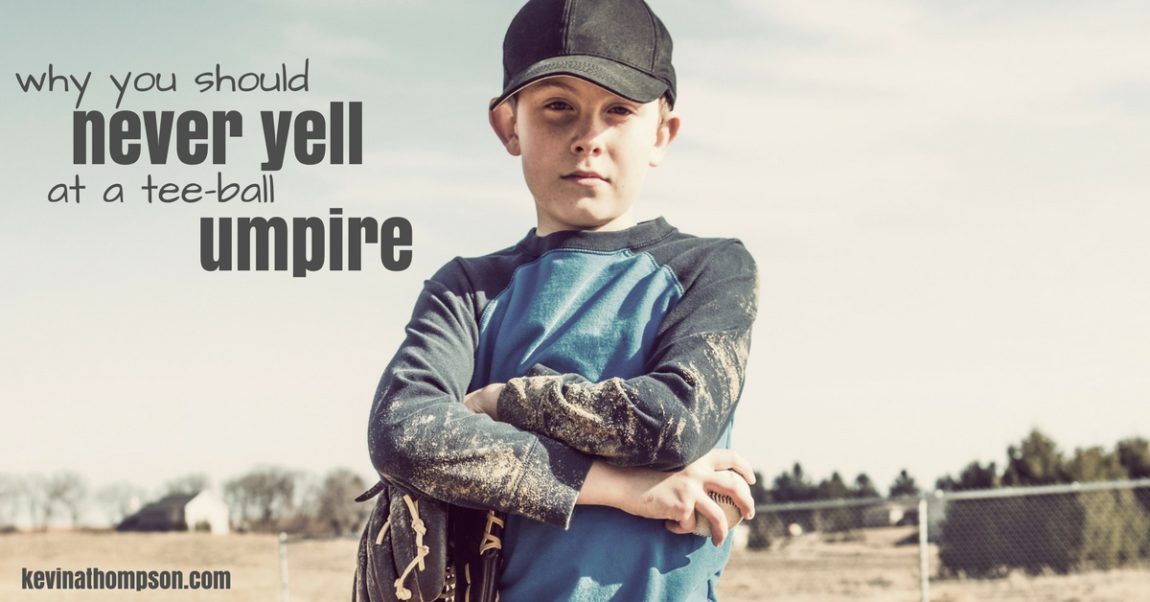You should never yell at a tee-ball umpire because you don’t want your kid to yell at you.
When I was eighteen I coached a 12-year-old baseball team for the Boys Club. Having been a pitcher I enjoyed teaching kids how to pitch. One player on the team was a catcher, but had a rifle of an arm and always wanted to try pitching. Throughout the season I always let him throw with the pitchers but he wasn’t ready for a game.
One day we arrived at the field and I handed in my line-up. As the game was about to start, the other team notified me they didn’t have the required number of players. The game was a forfeited. Yet since we were all there, we decided to play a scrimmage. I never even thought about changing my line-up. It was a perfect chance to do so, but the thought never crossed my mind. As our team took the field, the father of the catcher began to yell profanities.
At first, I didn’t know who he was upset with, but it became clear he was furious at me. Knowing the game was a forfeit, he couldn’t understand why his son was catching instead of pitching. He had a great point. Yet instead of talking that point over with me, he threw a fit, demanded that his son remove the catching gear and he left. My last memory of this father is him getting in his car while he was yelling profanities at me and flipping me off. (See: A Sign of Doubt: Why Your Co-Worker Screams His Opinions)
The sad part about the whole ordeal is that he was right. I agreed with his point. Had I thought about it, I would’ve let the kid pitch. Had the Dad brought it to my attention at the end of the first inning, the kid would’ve probably been pitching by the third inning. Yet he didn’t, so the kid didn’t.
I’ve always thought about that kid and his Dad. I wonder:
- When the kid was 16, how many times did he yell at his Dad and flip him off when he thought his Dad was wrong?
- How frustrated was the Dad at not understanding why his son wouldn’t obey him or respect him?
- Did the Dad ever realize the message he sent his kid that day regarding submission to authority or how to handle conflict?
Every year I watch as grown men and women lose their minds at the sporting events of 8-year-olds. A bad call is made and they go crazy. In what is one of the greatest teaching moments which a sport can present, every thought of teaching goes out the window as the parent/coach desperately tries to get a call overturned.
What the adult fails to realize is in that moment they are teaching their child how to handle conflict with an authority figure; they are teaching their child how to respond when they disagree with their parent. They are modeling behavior from which their child will learn. (See: Never Hire Someone Who Blames the Umpire)
Which is more important: whether a player is out or safe in a little league baseball game or teaching your child how to handle disagreements with respect, dignity, and submission to those in power?
Sports are a great avenue through which to teach our children. Yet whenever the teaching takes a back seat to the winning, little league athletics can become an ugly display of humanity. However, when teaching is primary and life trumps baseball, tremendous life change can take place even when a call is wrong.
A smart coach/parent longs for a bad call, an unfair amount of playing time, or some other negative situation because they provide the best opportunity to show our kids how to handle these situations. Show me a parent or coach who handles adversity properly and I’ll show you a kid who is far more likely to respect their parents, obey the law, become a good employee, and treat others the way they want to be treated.
Why should you never yell at a tee-ball umpire? Because you do not want your child to treat you that way when they disagree with your judgment calls and how you handle your authority.




10 Responses to Why You Should Never Yell at a Tee-Ball Umpire